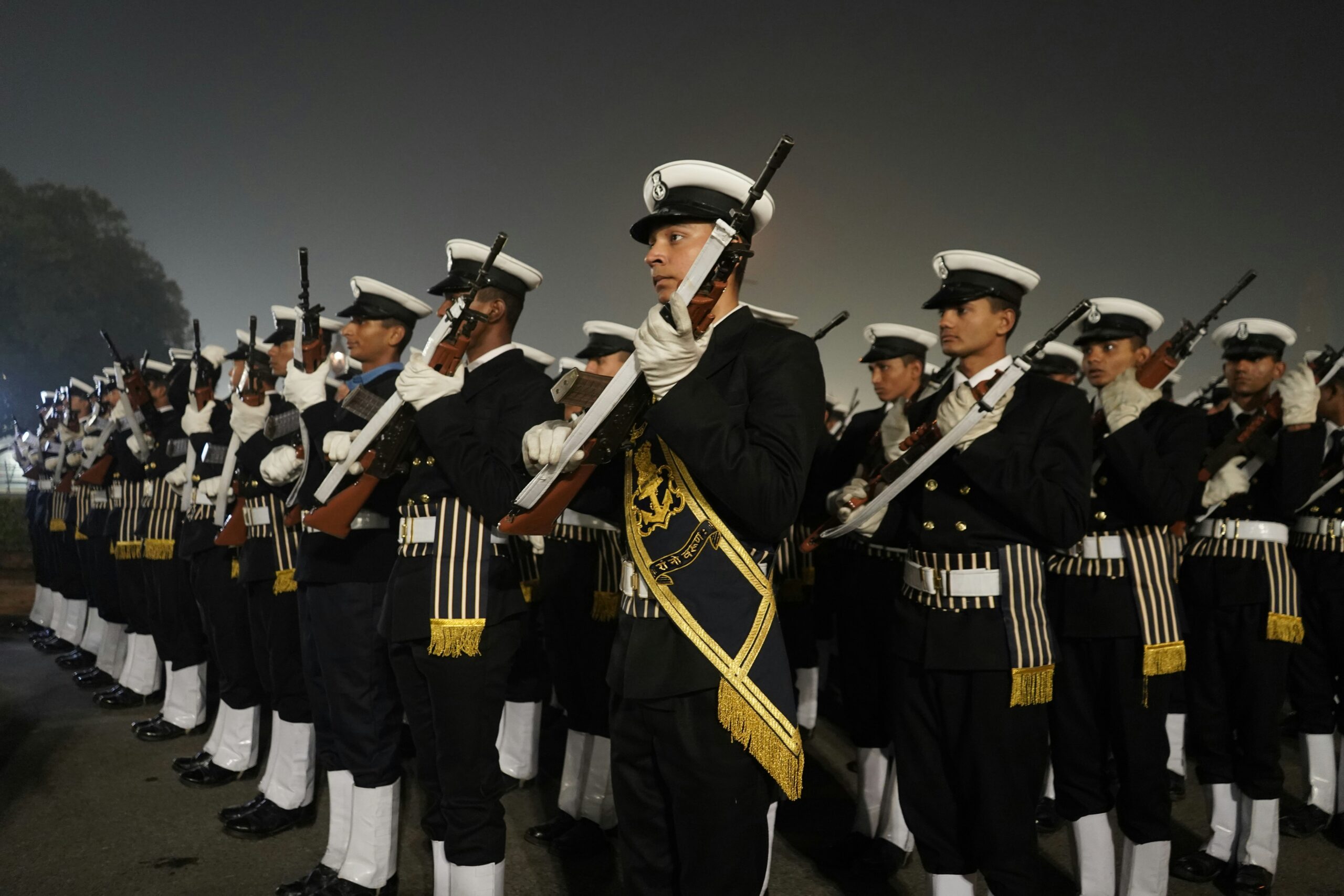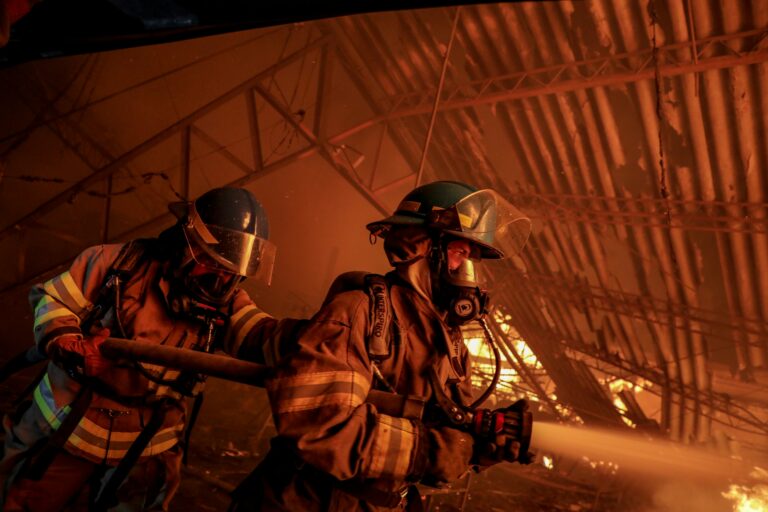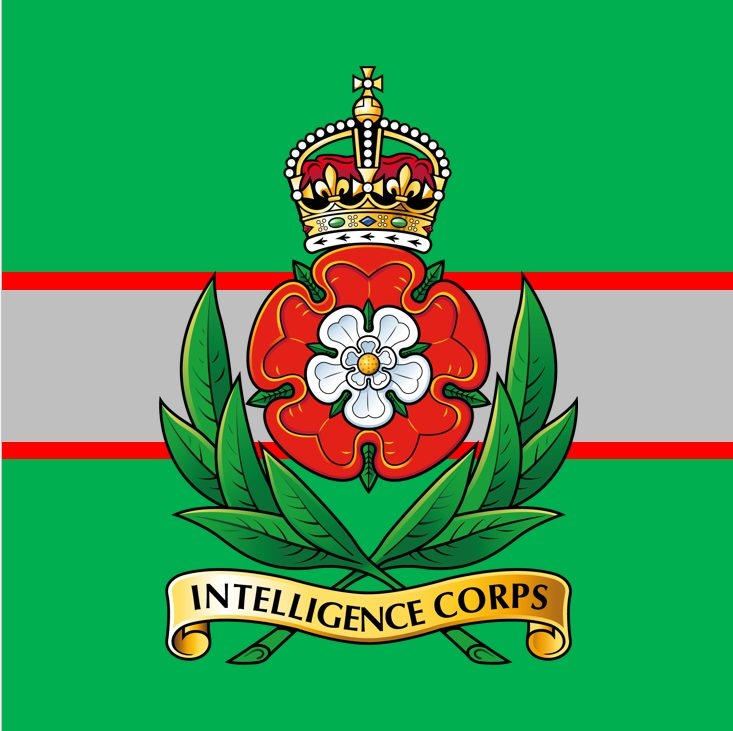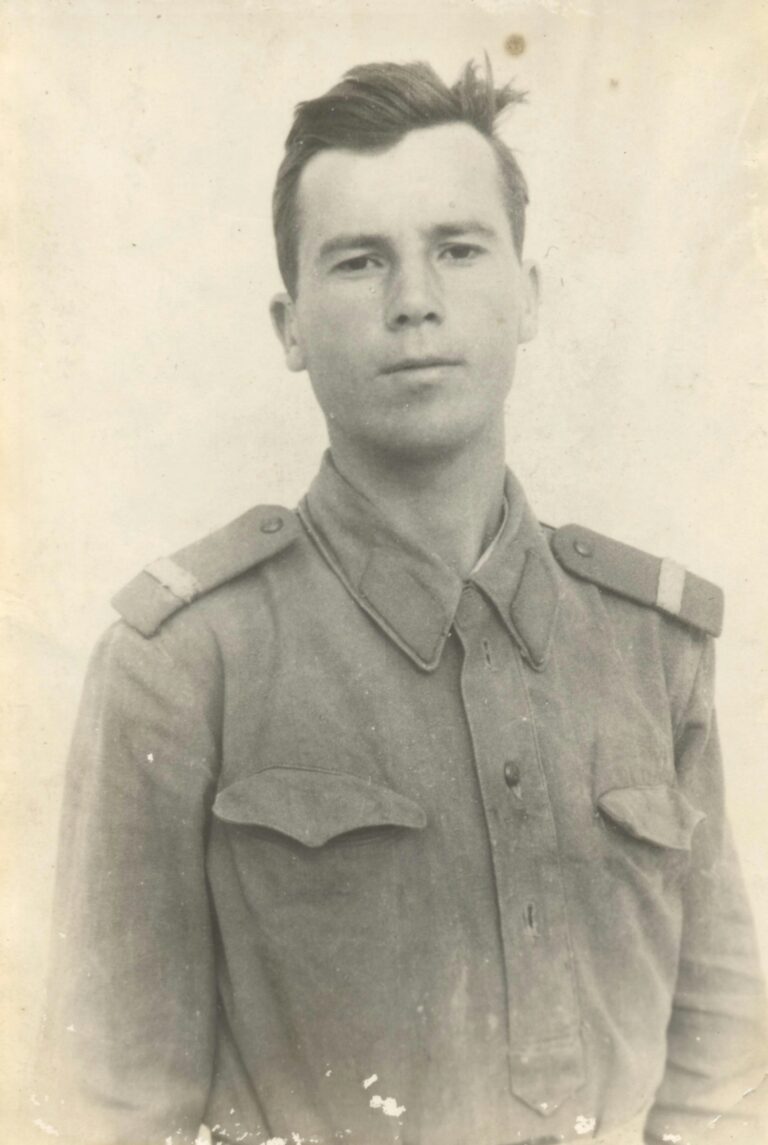Military Musicians
Introduction
While guns, tanks, and aircraft often symbolize military might, the power of music in the British Armed Forces is equally significant. From solemn state funerals to triumphant parades, Military Musicians play a vital role in preserving tradition, morale, and ceremonial excellence.
These musicians serve full-time within the Army, Royal Marines, and Royal Air Force — blending artistic mastery with military discipline. Their work is far from just symbolic: it includes battlefield roles, international diplomacy, and music therapy.
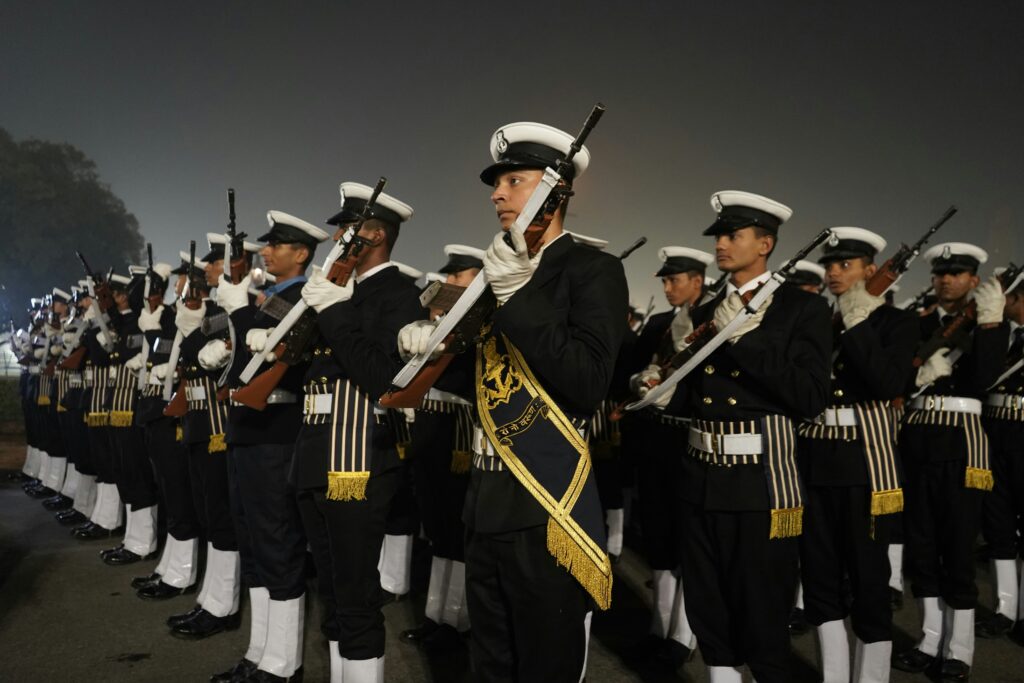
Who Are Military Musicians?
A Military Musician is a fully enlisted member of the UK Armed Forces who performs in official military bands, corps of drums, and orchestras. Each service has its own musical branches:
- British Army: Corps of Army Music (CAMUS)
- Royal Marines: Royal Marines Band Service (RMBS)
- Royal Air Force: RAF Music Services
These personnel are trained soldiers and musicians, often performing at some of the most important and high-profile state events in the UK and abroad.
Branch Breakdown
1. Corps of Army Music (CAMUS)
- Founded in 1994 to centralise all Army bands
- Comprises over a dozen bands (e.g. Band of the Coldstream Guards, Band of the Royal Regiment of Scotland)
- Based at Kneller Hall, Twickenham (now moving to Gibraltar Barracks)
2. Royal Marines Band Service
- Elite musical corps known for precision, pageantry, and dual medical/combat roles
- Trains at the Royal Marines School of Music in Portsmouth
- Performs globally, including aboard Royal Navy ships
3. RAF Music Services
- Includes the Central Band of the RAF, RAF Regiment Band, and College Band
- Known for concert work, flypast events, and international tours
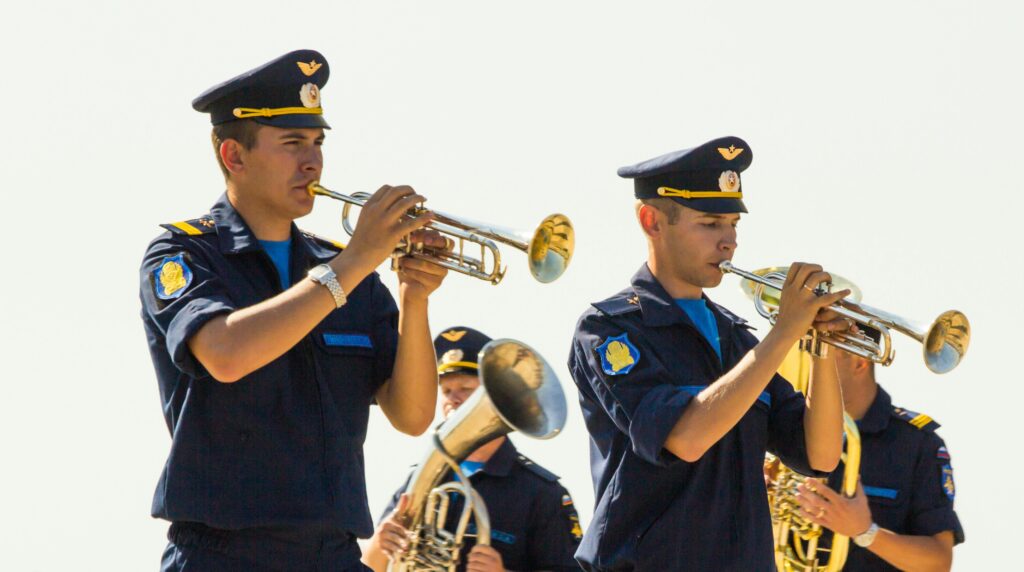
Core Duties and Responsibilities
| Role | Description |
|---|---|
| Ceremonial Performances | Royal events, state banquets, military tattoos, changing of the guard |
| Parades and Inspections | Trooping the Colour, remembrance services, overseas engagements |
| Military Funerals | Provide dignified accompaniment for fallen service members |
| International Diplomacy | Perform on global tours to promote UK interests |
| Morale and Welfare | Boost spirits on deployments, hospital visits, or conflict zones |
| Secondary Duties | Medical assistance (RMBS), logistics, administration, or signals |
A Day in the Life of a Military Musician
Daily life varies depending on assignments. However, routines may include:
- Rehearsals for upcoming performances
- Physical fitness training
- Drill practice
- Instrument maintenance
- Travel preparations for tours
- Classroom music theory and composition lessons
- Secondary training (e.g. battlefield first aid)
Musicians balance military life with artistic development, often holding concert seasons and studio sessions alongside ceremonial duties.
Training Pathway
1. Initial Military Training
- Army: Basic soldier training at Pirbright or Winchester
- RAF: Recruit training at RAF Halton
- Royal Marines: Commando training (for RM musicians, adapted to role)
2. Musical Training
- Army: Formerly at Kneller Hall; now moving to Gibraltar Barracks
- RMBS: Royal Marines School of Music, Portsmouth
- RAF: RAF Northolt and associated institutions
Subjects taught:
- Music theory and composition
- Conducting and arrangement
- Ensemble performance
- Instrument mastery (brass, woodwind, percussion, strings, etc.)
- Marching and drill band choreography
- Ceremonial protocol and uniform standards
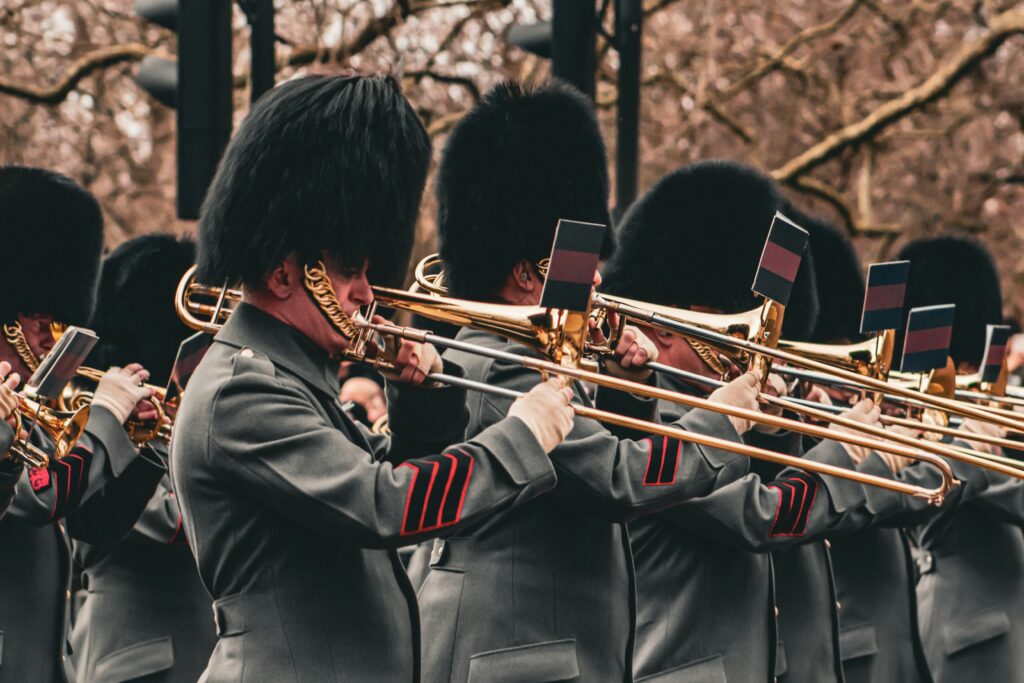
Instruments and Ensembles
Military musicians may specialise in:
- Brass (trumpet, trombone, tuba, French horn)
- Woodwind (clarinet, saxophone, oboe, bassoon)
- Percussion (snare, timpani, cymbals)
- Strings (violin, double bass – mostly in orchestras)
- Voice (choirs, vocal ensembles)
- Keyboard (piano, organ)
Ensembles include:
- Wind bands
- Concert bands
- Jazz ensembles
- Corps of drums
- Big bands
- Chamber music groups
- Symphonic orchestras (Army and RAF)
Key Events and Deployments
Military Musicians regularly perform at:
- Trooping the Colour
- State funerals (e.g., Queen Elizabeth II)
- Royal Weddings and Jubilees
- Remembrance Sunday at the Cenotaph
- Military tattoos (Edinburgh, Basel, etc.)
- Overseas diplomatic tours (Japan, USA, Middle East)
- Operations abroad (Falklands, Cyprus, Afghanistan – for morale)
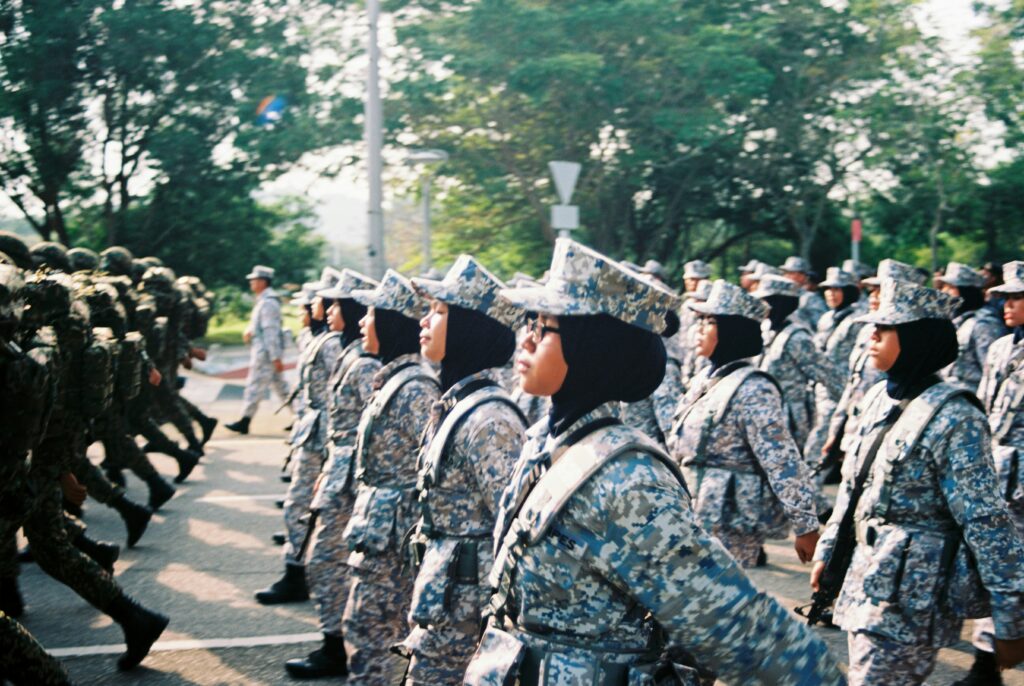
Military + Music Dual Identity
Military musicians maintain:
- Combat fitness levels
- Basic weapon proficiency (especially Army and RAF)
- For RMBS: dual role as combat medics on deployment
- Drill discipline and uniform standards
- Security clearances and operational awareness
Their ability to switch between instruments and infantry-style duties is unique in the modern armed forces.
Career Progression
| Rank | Role |
|---|---|
| Musician / Junior Technician / Musician RM | Performs in ensembles and events |
| Lance Corporal / Corporal | Section leader or lead instrumentalist |
| Sergeant / Colour Sergeant | Bandmaster assistant or ensemble leader |
| Warrant Officer / Bandmaster | Oversees full band operations and training |
| Commissioned Officer (Director of Music) | Conducts bands, manages musical direction, leads major events |
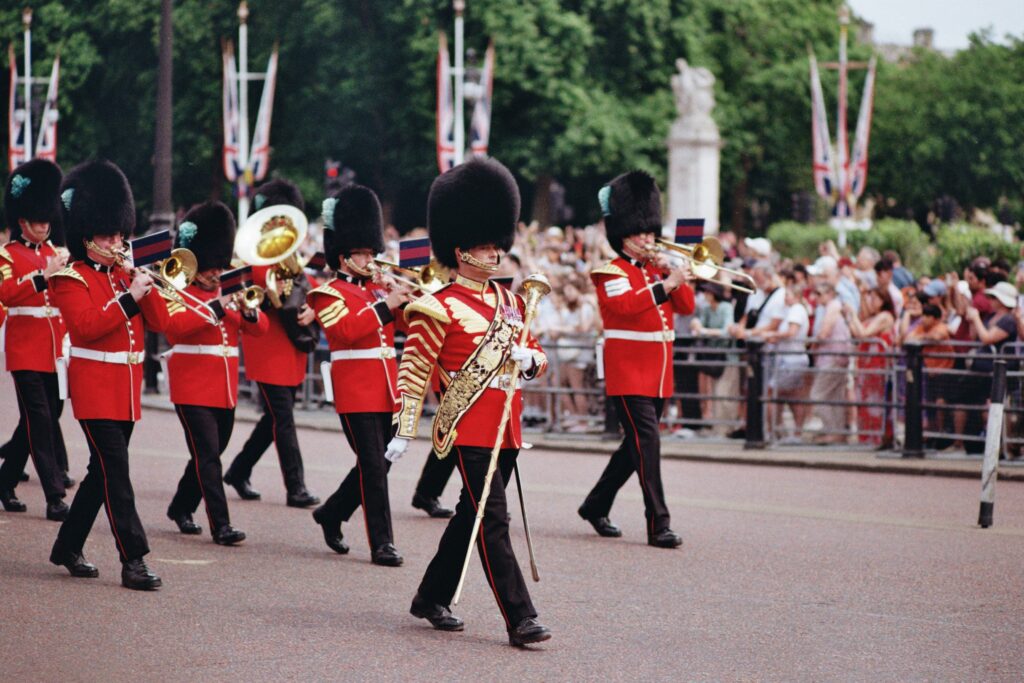
Pay and Benefits
- Starting salary: £21,000+ after training
- Free instruments, uniform, travel, and accommodation
- Paid travel worldwide
- Funded music diplomas, degrees, and conservatory education
- Opportunities to record, broadcast, and perform at elite venues (Royal Albert Hall, Windsor Castle)
Civilian Career Opportunities
Musicians leaving the service are well-equipped for:
- Symphony orchestras
- Music teaching (schools, colleges)
- Music therapy
- Event production and logistics
- Performing arts management
- Studio recording or broadcasting
Many transition to civilian roles in:
- Theatres
- Police or fire service bands
- Cruise ship entertainment
- Music composition and sound design

Famous Military Musicians & Legacy
- The Band of the Grenadier Guards – one of the oldest in the world (est. 1685)
- RMBS musicians performed at Princess Diana’s funeral, 2022 Jubilee, and Coronation of King Charles III
- RAF bands supported troops in Afghanistan, Iraq, and NATO operations
- Hundreds of televised events rely on military musical precision and artistry
Conclusion
Military musicians are not just performers — they are guardians of tradition, morale boosters for troops, and ambassadors of British identity. They serve in times of war and peace, conflict and celebration, with unwavering discipline and artistry.
In a career that offers both stage and service, Military Musicians stand tall — with a baton in one hand and saluting with the other.
